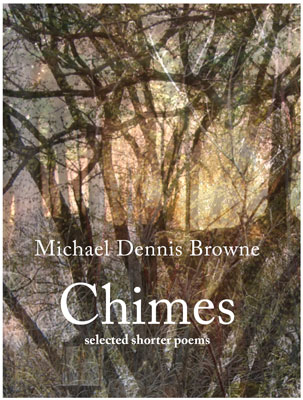| <- Back to main page |
(Nodin Press)

I remember when Michael Dennis Browne appeared as a guest speaker for my Creative Writing class. This was at the University of Minnesota, in and around 1989. He was a big middle-aged guy with a beard and a booming English voice. I recall being decidedly unimpressed by his poetry, which seemed almost as insipid to my twenty-year-old ears as Robert Bly’s. But I can still recall the English voice, and how he stood up his published poetry collections, four or five books, all in a row, and said something along the lines of: “These are all in the past. They don’t matter anymore.”
But Browne must have thought at least now and again about his past work, because his newest volume, Chimes, is a selection of shorter poems from across his entire career, dating back to the 1960s. The collection is organized thematically (nature, family, dreams, etc.) so that there is no telling which book or era a particular poem originated from. And this turns out to be an effective arrangement, as the poems cohere quite well with each other, except for a few outliers, such as “Light upon the Water” with its rhyming trochaic tetrameter, which seems almost like a wedding poem penned in college:
Like the light upon the water,
Summer in the swaying tree,
Radiance of the woken flower,
You are all these and more to me
But elsewhere we have Browne’s well-defined voice, melodic and declarative and very much from the end of the 20th century, as in the opening lines of “To the Leaf, October”:
You are like something the sun
has fashioned from its own
flesh, and lets hang here.
Other Browne poems have the texture and randomness of overheard muttering. And some are just imagistic blurs with glimpses of meaning, like “North Shore”:
gulls’ cries lace
my shoes of stone
Or the riddle-like “Mary My Sister”, with its echoes of Gerard Manley Hopkins:
help Mary in drowned heaven
our safe little remember stream children
We hear of Mary again in “Good Friday, 6 a.m., Devon, Listening to Mary and the Blackbird”, a poem that provides a clue about why Browne chose “Chimes” for the collection’s title:
Even a father would not say
You cause the sun to clamber up,
All sinew, from the valley floor;
No, not for any song of yours
But chimed by them, he’ll slowly rise
Indeed, Chimes feels less like its own dwelling and more like a series of windows on the poet’s greater life. And by life I mean not only personal feelings (yes, like most contemporary poets, Browne writes a good deal about himself), family, friends, and occasions, but in odd little alone moments, such as “The Things You Think You Hear”:
one night a wedding
with bells
but the street is empty
one January
the watering
of a garden...
Noticeably missing from these scenes from real life is any reference to academia, where Browne spent most of his career, including nearly forty years teaching at the University of Minnesota. The only hint in Chimes that Browne belongs to the overpopulated field of academic poets is in a few poems addressed to other U of M faculty, such as the touching tribute to John Berryman, “Owl”:
He is there, with his large eyes,
high above us,
who were never close.
He will not say, he will not say
what it is he wants.
Berryman’s “Dream Songs” and other contrivances feel tired now as smog from the ‘70s. But Chimes, bridging that era and this, is curiously transcending. Though some of Browne’s “chimes” may have been written when the Beatles were still together, they are still a fresh read, filled with razor-thin lines and kaleidoscopic scenery—and that booming English voice.
- Joel Van Valin 